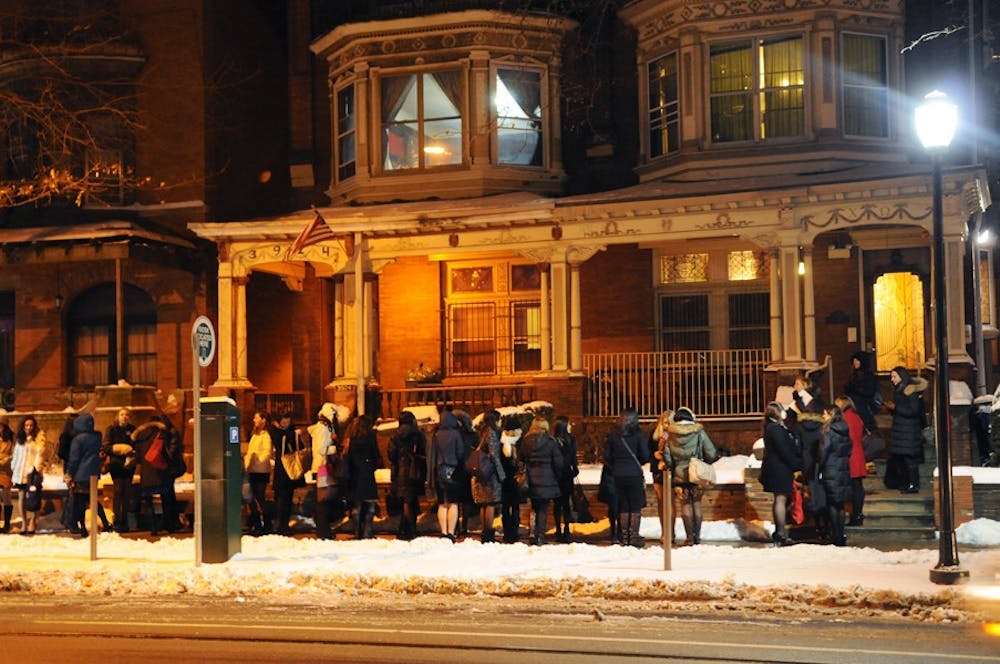A study on the effects of sorority recruitment on students’ self-perceptions led by a Penn student and professor is set to conclude in April.
College senior Colleen Kase and Psychology professor Melissa Hunt, aided by College junior Natasha Rivera, are working on a long-term study to examine the psychological impact of sorority recruitment. Their research focuses on two angles: the factors that affect a student’s decision to participate in recruitment, and its effects on the student’s perceived social support — which is the degree to which a person believes they are valued. Meaningful results will not be acquired until April.
Both Kase and Hunt said that most existing research on sorority membership and Greek life tends to highlight their negative aspects, such as substance abuse and eating disorders. Few studies have concentrated on social support, they said, despite the common objective of sororities to foster a sense of community among young women. Conversely, there is also a lack of research on whether rejection from a sorority negatively impacts a student’s mood or perceived social support.
Related: Greek directory social network relaunched
“We want to do a balanced study that lets us examine both the positive and negative impact[s] of sorority recruitment on the individuals who take part,” Hunt said.
The team hypothesized that a successful recruitment process would boost a student’s mood and perceived social support, but that an unsuccessful experience would bring the opposite.
“We also expect that individuals who already feel high levels of support in the fall will be less likely to participate in rush in the spring,” Hunt added.
However, Kase said that the findings of the study may not be applicable to colleges everywhere, due to the timing of Penn’s spring recruitment and its status as a competitive research university.
Related: New Panhel president talks goals, plans for coming year
The study will use surveys administered to female freshmen between Nov. 1, 2013 and April 1, 2014. Participants in the study will complete five surveys during the recruitment process. For the sake of simplicity, only female members of the Class of 2017 were invited to participate, and the research focuses solely on sororities that are members of the Panhellenic Council.
Students who do not plan to participate in formal recruitment were also asked to take part in the study, as their responses can be later compared to those of the students who participated in recruitment.
Hunt said the idea first struck her a few years ago when she read a Daily Pennsylvanian article about Bid Night, which quoted many girls who had been selected for sororities, calling it the “best night of their lives.” Hunt was amazed that the article did not include the opinions of girls who were not accepted into sororities. Kase, as a member of Penn’s Alpha Phi chapter, was surprised at the lack of positive research about sorority membership. When Kase decided to do her honors thesis with Hunt, they combined their ideas to form a project that would examine the sorority selection system in an objective manner.
Related: Sorority, medical residency recruitment similar
College senior Rachel Ruda, vice president of recruitment for the Panhellenic Council, is confident that Penn’s recruitment process has a resounding positive impact.
She said that support is built into the recruitment process through the Rho Gamma system. Potential new members are organized into small groups of about ten and assigned to a Rho Gamma, or recruitment guide, who serves as a mentor to the freshmen. The system aims to help girls become more comfortable with the process and provides an intrinsic element of support.
“While it is inevitable that some women will find aspects of formal recruitment stressful, in the end this experience is so beneficial for so many reasons for those that choose to partake in it,” Ruda said. “That’s why Panhel continues to do what it does.”



